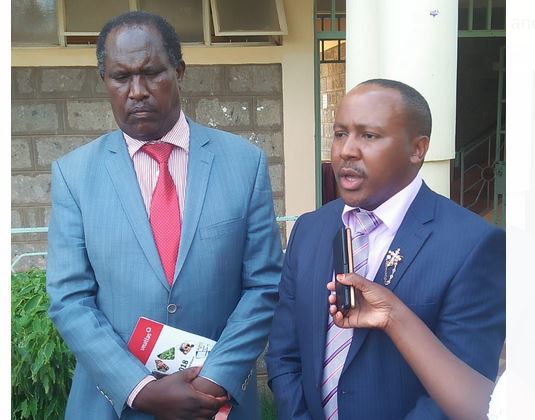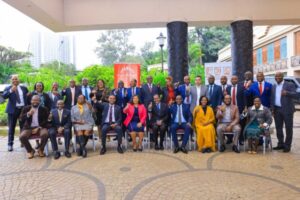Unaitas Sacco has dropped bid to convert into a bank, citing a Central Bank of Kenya (CBK) moratorium order as well as the need to grow further.
The process of applying for a banking licence has however been the biggest hurdle. An insider has informed Kenyan Bulletin that some of the managers have been inciting members not to support the idea on grounds that they will end up losing their positions in management.
“It is self-preservation. Some of the board members are afraid of the stringent conditions and scrutiny that comes with a banking licence,” the source said, adding that it will be a miracle for a number of them to pass the proper and fit test that comes with integrity searches and compliance requirements from the Kenya Revenue Authority, the Higher Educations Loans Board, Central Bank and the DCI.
There has been massive internal fraud at the SACCO and the board members are at the center of all the troubles the Unaitas has plunged in.
The sacco dropped this from its 2019/2023 strategic plan despite saying that it had invested in processes and systems to match banking requirements. It had initially set 2018 as the deadline of converting into a bank.
“We invested in processes and systems to be able to take us into a bank. But in between the moratorium came and then then the Cooperative policy 2019 came. Within the current strategy, our main objective is growth,” said CEO Martin Muhoho in an interview.
History Of Unaitas.
In 1993, a group of tea farmers from Murang’a came together to start what promised to be the next big thing after James Mwangi’s Equity Bank. Their dream grew like a whirlwind. From the tea farms of Murang’a, they grew to become an enviable Savings and Credit Cooperative Society among its peers. It cased its eyes on becoming a commercial bank by September 2016.
In 2007, the Sacco re-branded to Muramati Sacco and would go by this name for another five years. Though its principal goal of ‘pooling resources to create a financial basket, where they could save and advance loans at affordable rates’ remained intact, the Sacco also went through another transformation.
By 2020 January, the sacco had about 300,000 members who had bought the minimum 100 shares at Sh10 each. Its capital base is now near Sh5 billion and boasts of Sh14 billion in assets.
Prospects of Expanding
Immediately it changed its name to Muramati, it decided to open its doors beyond its initial tea growing customer base. This saw it open its purse strings to also serve medium size enterprises and salaried employees.
The shift saw it recruit new members faster than most financial institutions were doing at the time. As its vision of getting a banking license became clearer, it became necessary to drop the Muramati name that could hurt its prospects of expanding beyond Central Kenya. It became Unaitas in 2012.

Infighting
Kenyan Bulletin can authoritatively say that things are not all well at the SACCO. There has been in-fights and a boardroom battle that is eating UNAITAS up from within. The battle is now threatening to hurt its march to becoming a fully-fledged bank, our sources have confirmed.
The has been a bad blood between board members. The fraudulent dealings in the SACCO is said to be the genesis of the wrangles.
“The talk is about slaying the Mugumo trees which means dealing with some of the staff seen as too entrenched or allied to the wrong camp. Several of these Mugumo trees have been felled,” the source told our news desk.
SACCOs are managed by staff employed by the board on behalf of the members, and the Chief Executive Officer is responsible for the day-to-day running of the SACCO business. The board reports to the members on the management of the SACCO at least once a year during the annual general meeting (AGM) or annual delegates meeting (ADM). During the AGM or ADM, the members also get a chance to assess the performance of a Sacco and make decisions concerning their SACCO.
This, however is different in the now struggling SACCO. The CEO has split the board into two and vital decisions have been left to a few pro CEO members.
The SACCO has Tony Mwangi as [former CEO], James Kinoro as the Chairperson, Rhoda Gachoka as the Chairperson Business Development Committee, Gabriel Mugo as the Chair Audit and Compliance committee, Francis Mburu, Farishia Kamuru, Michael mureith, Joseph Kabugu, erastus mwangi and Peter Kamangara are listed as Board Members.
Insider Hacking Fraud
According to a report written by Hannington Chumba, a forensic examiner from the Cyber Crimes Unit at the DCI, and seen by Kenyan Bulletin, the first cyber-attack happened between February and March last year was initiated remotely and was carried out through masked IPs.
Its server was hacked and data manipulated in over 256 accounts leading to a loss of an unknown amount of money. The attacker was able to navigate through flagged accounts, unflag and transfer funds, it adds. There were also a number of logs generated from mobile transaction and deleted successfully.
After going through 682 gigabytes of data mined from the servers in Murang’a, DCI noted that the fraudulent activities had been made to appear as having been initiated by users who last genuinely updated their accounts, however a close scrutiny revealed that some of the users had long left the organisation.
“It is noted that the attacker manipulated the date and time spreading the attack period to six years, that is 2012 to 2017 purposely to misdirect investigations,” the report seen by Kenyan Bulletin reads in part.
Second Hacking Fraud
Unaitas’ chief executive officer Martin Muhoho, not listed on their site, explained that the attack was not isolated and that at least eight other saccos suffered similar attacks.
“The intrusion did not happen on our core banking system and it was not our fault,” Muhoho said, adding that their sacco has since invested in the latest technology in the T24 core banking system.
He said Unaitas has recovered part of the money in the second attack and is pushing the service provider to refund the money. He however refused to reveal just how much has been lost.
“It is a complex matter. When I ask I am told the hackers were from Yemen and Jordan. However, such an amount of money cannot have been withdrawn through an agent,” Joseph Kabugu said, adding that the attack did not just affect Unaitas but several others that run on the M-Sacco platform provided by Coretec Systems, an IT company.
Unaitas Struggling
But the biggest challenge for Unaitas at the moment is the growing bad debts which are threatening to wipe away all its profits. In the first 10 months of the year, its total income was Sh1.3 billion, which is 43 per cent off target.
Its financial numbers shown to the Kenyan Bulletin team indicate that its debtors and prepayments shot up by 751 per cent in the last one year, a sign of trouble ahead. The figure grew from Sh115 million in 2017 to Sh985 million this year.
Its return on assets has also dipped from 2.1 per cent to less than one per cent. Its return on equity ratio has also more than halved from the nine per cent it posted in 2017 to about three per cent by October this year.



















